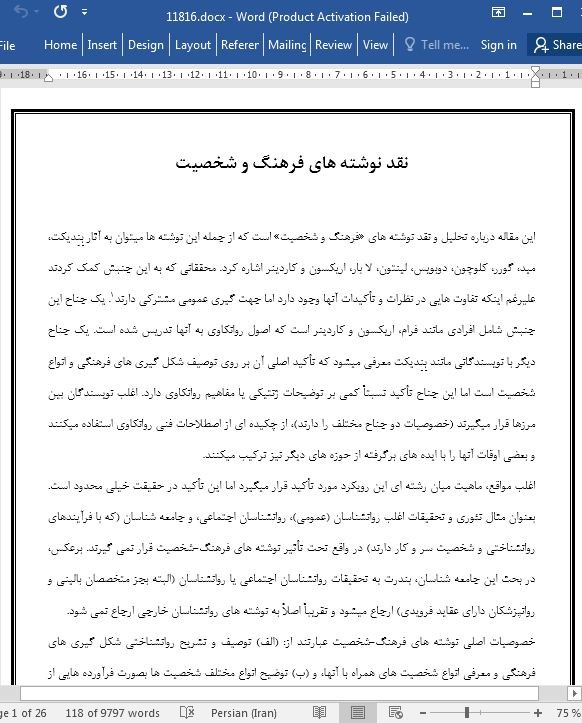
نقد نوشته های فرهنگ و شخصیت
این مقاله درباره تحلیل و نقد نوشته های «فرهنگ و شخصیت» است که از جمله این نوشته ها میتوان به آثار بِنِدیکت، مید، گورر، کلوچون، دوبویس، لینتون، لا بار، اریکسون و کاردینر اشاره کرد. محققانی که به این جنبش کمک کردند علیرغم اینکه تفاوت هایی در نظرات و تأکیدات آنها وجود دارد اما جهت گیری عمومی مشترکی دارند . یک جناح این جنبش شامل افرادی مانند فرام، اریکسون و کاردینر است که اصول روانکاوی به آنها تدریس شده است. یک جناح دیگر با نویسندگانی مانند بِنِدیکت معرفی میشود که تأکید اصلی آن بر روی توصیف شکل گیری های فرهنگی و انواع شخصیت است اما این جناح تأکید نسبتاً کمی بر توضیحات ژنتیکی یا مفاهیم روانکاوی دارد. اغلب نویسندگان بین مرزها قرار میگیرند (خصوصیات دو جناح مختلف را دارند)، از چکیده ای از اصطلاحات فنی روانکاوی استفاده میکنند و بعضی اوقات آنها را با ایده های برگرفته از حوزه های دیگر نیز ترکیب میکنند.
اغلب مواقع، ماهیت میان رشته ای این رویکرد مورد تأکید قرار میگیرد اما این تأکید در حقیقت خیلی محدود است. بعنوان مثال تئوری و تحقیقات اغلب روانشناسان (عمومی)، روانشناسان اجتماعی، و جامعه شناسان (که با فرآیندهای روانشناختی و شخصیت سر و کار دارند) در واقع تحت تأثیر نوشته های فرهنگ-شخصیت قرار نمی گیرند. برعکس، در بحث این جامعه شناسان، بندرت به تحقیقات روانشناسان اجتماعی یا روانشناسان (البته بجز متخصصان بالینی و روانپزشکان دارای عقاید فرویدی) ارجاع میشود و تقریباً اصلاً به نوشته های روانشناسان خارجی ارجاع نمی شود.
خلاصه و پیشنهادات
این مقاله به نقدهای منفی اختصاص داده شده است که توسط ما و دیگران مطرح شده است، و در مورد نتیجه گیری ها، شواهد، روشها و چارچوب مفهومی کلی پیشنهاد شده می باشد که توسط نویسندگان فرهنگ-شخصیت مورد استفاده قرار گرفته است. برای ما به نظر میرسد که این نقدها بطور واضح نشان میدهند که شواهد موجود ارائه شده توسط نویسندگان در پشتیبانی از نتیجه گیری های خود کافی نمی باشد و نتیجه گیری های آنها را توجیه نمی کند. تعمیم های مثبت انجام شده در این حوزه معمولاً بر مبنای اطمینان بدون تضمین به روشهای غیرعلمی نامناسب برای تفسیر داده ها و بر مبنای یک پذیرش نسبتاً نسنجیده از یک طرح مفهومی خاص است.
THIS paper is concerned with an analysis and criticism of what have come to be known as "culture and personality" writings, including among others the work of Benedict, Mead, Gorer, Kluckhohn, DuBois, Linton, La Barre, Erikson, and Kardiner. The scholars who have contributed to this movement have a common general orientation although some differences of opinion and emphasis exist.' One wing of the movement includes psychoanalytically trained persons like Fromm, Erikson, and Kardiner. Another wing, represented by a writer like Benedict, places the main emphasis upon descriptions of cultural configurations and personality types, but puts relatively little emphasis upon genetic explanations or on psychoanalytic concepts. Most of the writers fall between the extremes, using a sprinkling of psychoanalytic terminology, sometimes in combination with ideas derived from other areas.
The interdisciplinary nature of this approach is often stressed but it is, in actual fact, sharply limited. For example, the theory and research of most psychologists, social psychologists, and sociologists who are concerned with personality and psychological processes, are virtually unaffected by the culture-personality writings. Conversely, in the latter there is rarely any reference to the research of social psychologists or psychologists other than clinicians and psychiatrists of Freudian persuasion, and almost no references to the writings of foreign psychologists
SUMMARY AND SUGGESTIONS
The bulk of this paper has been concerned with negative criticisms, raised by us and others, concerning the conclusions, evidence, methods, and general conceptual framework offered and used by culture-personality writers. These criticisms seem to us to indicate quite clearly that available evidence offered by the writers in support of their conclusions is inadequate and does not justify their conclusions. Positive generalizations made in this area are generally based upon unwarranted confidence in rather loose unscientific methods of interpreting data, and upon a relatively uncritical acceptance of a particular conceptual scheme
مروری بر جامعه شناسی آمریکایی
شکل گیری فرهنگی و دیدگاه شخصیت هنجاری
نقد
آشفتگی حقایق و تفسیر
توسعه دیدگاه شخصیت مبنا یا هنجاری
نقد
انسان انگاری
خلاصه و پیشنهادات
AMERICAN SOCIOLOGICAL REVIEW
CULTURAL CONFIGURATION AND MODAL PERSONALITY POINT OF VIEW
CRITICISM
Oversimplification and the homogeneity postulat
Confusion of Fact and Interpretati
The Operation of Western Biase
DEVELOPMENT OF MODAL OR BASIC PERSONALITY POINT OF VIEW
CRITICISM
Effects of Infant Experience Are Undemonstrat
SUMMARY AND SUGGESTIONS
- اصل مقاله انگلیسی با فرمت ورد (word) با قابلیت ویرایش
- ترجمه فارسی مقاله با فرمت ورد (word) با قابلیت ویرایش، بدون آرم سایت ای ترجمه
- ترجمه فارسی مقاله با فرمت pdf، بدون آرم سایت ای ترجمه

